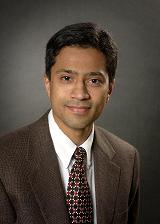 Timothy Bhattacharyya, MD, is a board-certified orthopedic surgeon in practice with OrthoBethesda in Bethesda, Md. Dr. Bhattacharyya focuses on joint replacement, fracture care, pelvis and acetabulum injuries, general orthopedics and orthopedic trauma. He completed his fellowship training in orthopedic trauma at Harvard Medical School in Boston. Dr. Bhattacharyya also serves as the head of clinical orthopedic research at the National Institute of Health.
Timothy Bhattacharyya, MD, is a board-certified orthopedic surgeon in practice with OrthoBethesda in Bethesda, Md. Dr. Bhattacharyya focuses on joint replacement, fracture care, pelvis and acetabulum injuries, general orthopedics and orthopedic trauma. He completed his fellowship training in orthopedic trauma at Harvard Medical School in Boston. Dr. Bhattacharyya also serves as the head of clinical orthopedic research at the National Institute of Health.
Here he discusses the challenges shaping the field, the best strategy for selecting implants and how bundled payments will affect orthopedic surgeons.
Q: Why did you choose to become an orthopedic surgeon?
Dr. Timothy Bhattacharyya: I was drawn to the dramatic improvement orthopedic surgery can have on patients. Take a patient who just had a tibia fracture. Proper surgery with an intramedullary nail can take him from being laid up in bed on pain medication, to home and back to work in a matter of weeks. It's rewarding.
Q: What are some the biggest challenges and trends shaping the field of orthopedics?
TB: One big challenge is properly evaluating and applying the evidence. We are increasingly held accountable for preventing complications and improving outcomes. So we need to be able to know for sure what treatments provide a benefit, and what treatments are not really helpful.
Another big challenge, as it is every year, is finances. Every year the insurance companies are asking us to do more and are paying us less. Overhead only goes up, never down. So we can't sit still.
Q: What do you think is the best strategy for choosing implants for orthopedic surgery?
TB: Being boring. Every year we see new implants with new claims of exciting improvements. But each new technology can bring new problems that are not always foreseen. So I like to choose the old fashioned, boring implants that have long track records and have worked well for years. I'm not interested in the latest hip prosthesis when the one I use already has greater than 95 percent survival rate at 10 years. That is tough to beat.
I will say that it is important to pay attention because sometimes new things come along that are right for specific problems. For example, there are new locking techniques for very distal tibia fractures — they can help in specific cases that we couldn't treat well before. There is a new technique using spinal implants for pelvic fractures. It expands our ability to treat patients.
Q: How do you think that bundled payments will affect orthopedics?
TB: I think it is a long way off. The idea that you give a single payment for an episode to the hospital, and then they divvy up the payments to the providers and keep any profit is an attractive one. But when you get into the details, it's really not easy. First, who decides how to divvy up the payment for a total hip replacement? The doctors have a lot of responsibilities, but the implant cost is the biggest line item. Second, complications happen. One bad case that has to go the ICU for an unpredictable complication can wipe out an entire year's surplus.
For the vast majority of the U.S., where surgeons are in private practice and go to multiple hospitals, bundled payments have numerous obstacles before they can become mainstream.
Q: What techniques have you found to be the most effective when trying to reduce costs in an orthopedic practice?
TB: The most effective technique is to eliminate procedures that have poor track records or no supporting evidence. The best example is viscosupplementation for knee arthritis. After numerous studies, it barely provides any benefit to patients and can cost almost $1,000. So I don't use it. Physical therapy works, anti-inflammatory medications work and total knee replacement works.
A series of articles featuring orthopedic surgeons on issues ranging from personal background to current research developments is published weekly. We invite all orthopedic surgeons and sports medicine specialists to participate.
If you are interested please email cpallardy@beckershealthcare.com.
More Articles on Sports Medicine:
Sports Medicine & Community Involvement in Orthopedics: Q&A With Dr. Paul Cain of Central Maine Orthopaedics
Catering to the Patient & Practicing Internationally: Q&A With Dr. Sonu Ahluwalia of Cedars-Sinai Medical Center
Building a Strong Sports Medicine Program & Online Presence From Scratch: Q&A With Dr. David Geier of MUSC Sports Medicine


